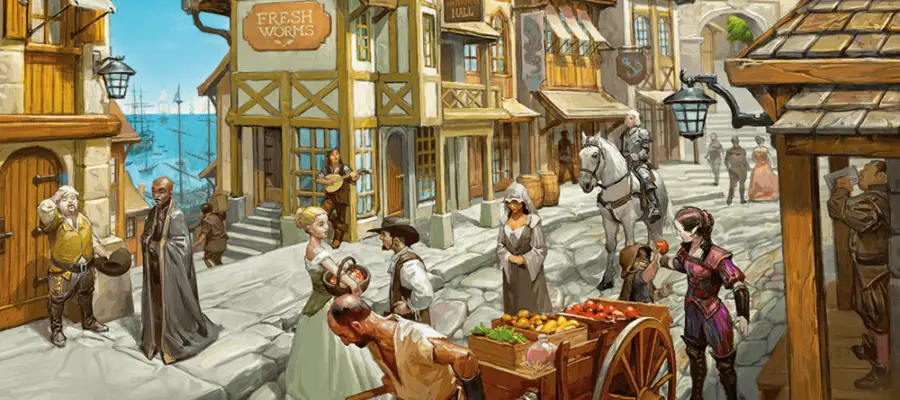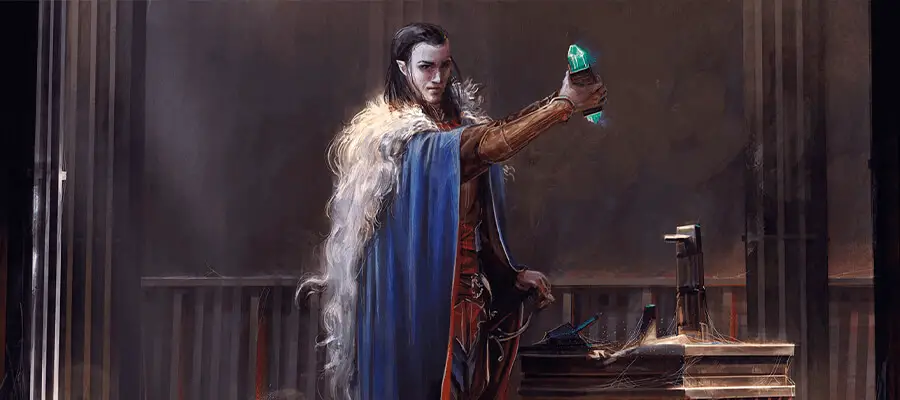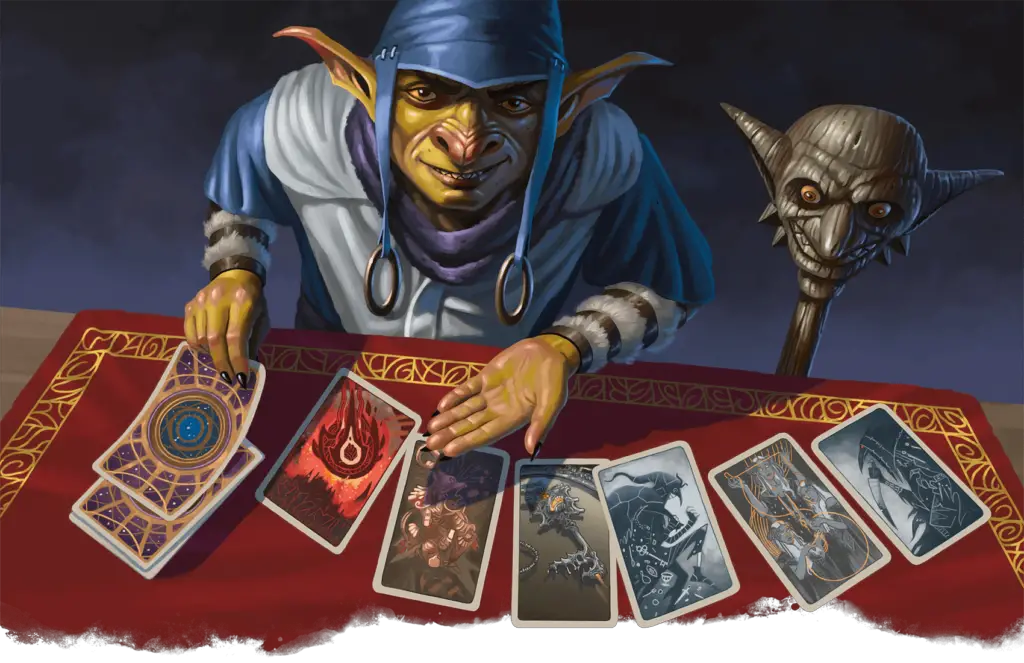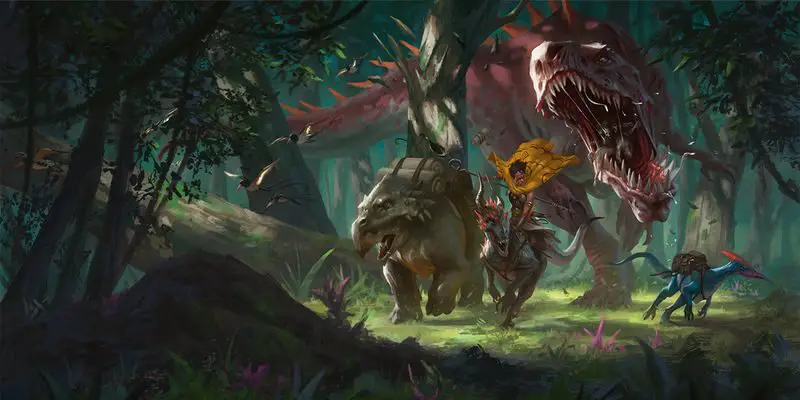Worldbuilding featured image is credited to Wizards of the Coast’s D&D 5e Waterdeep: Dragon Heist.
Disclaimer: This article contains affiliate links that add gold to our coffers.
I think we can all agree that most players have a strong desire to be the heroes of a campaign. They’ll face encounters head-on and overcome the toughest problems of the world, even saving it from total destruction at times. While it’s gratifying for players to conquer epic villains, there can be myriad challenges out of grasp for the players that supplement the commentary of the world.
When players hear of geopolitical challenges, problematic societal beliefs, inter-species conflicts, and general movements throughout the land, they may not feel compelled to tackle such vast and vague problems, but they will discover how these dilemmas shape the campaign around them.
In this way, players can experience an immersive and dynamic world full of personable and relatable societies while exploring how their characters fit within that world. Here are ten examples of passive worldbuilding to incorporate into your campaign.
1. Advancing Technologies
Particularly for ongoing campaigns, advancing technologies provide an avenue for players to experience an ever-changing world. In our history, these changes have been guns, trains, automobiles, planes, computers, and so forth. In the realm of Dungeons and Dragons, while these examples certainly can be utilized, a Dungeon Master has another dimension of changing technology to explore: magic.
Whether it’s a new branch of magic that opens up, a powerful magic item that becomes readily available to everyone from a peasant to a king (such as items that allow teleportation), players can engage with the new magic readily available and its quirks or flaws while kingdoms and rulers hammer out the governing details and regulations.
Good Examples: Nonmagically, The Legend of Korra and Demon Slayer do fantastic jobs of showing a world transitioning into technology. Where some places maintain their village-like essence, more modern corners of the world are implementing vehicles, trains, and other advanced technologies that give characters unforeseen opportunities.
2. Monster Rights as Sapient Beings
In campaign settings such as Tal’Dorei, not all monsters are evil and therefore have rights as sapient beings. A Dungeon Master can begin this journey of social change to introduce and explore ideas of species prejudice and group morality.
Choose an “evil” monster species with Intelligence 8 or lower. In your campaign, give these creatures an intelligence of 10, evolved to be moderately civil, and allow them to learn to speak Common. These creatures had previously been categorized as “monsters” and evil and therefore killable when encountered. But with an evolving intelligence, and with a world of species coexisting in civilization, these creatures are now fighting for their right to be accepted into society and not killed on sight.
Because of historic clashes and these creatures being categorized as “monsters,” there will inevitably be species or races unwilling to relinquish their prejudices. Therefore, this will be an ongoing matter that players can encounter and interact with, but not solve, necessarily. Nevertheless, players can enact change in small ways and in single hearts, villages, cities, and kingdoms.
Good Examples: Terry Pratchett’s Discworld is rife with examples of this. In the book Men At Arms, some trolls, though relatively stupid and historically antagonistic to dwarves, fought for their right to be accepted into Ankh-Morpork society. Dwarves vehemently protested this, and some trolls were against this modernization, but ultimately, the powers of Ankh-Morpork ruled that trolls were sapient and therefore had rights to exist in society. War nearly ensued, as forces schemed underground to keep trolls discriminated against, and it took a lot of effort to turn the hearts of citizens toward accepting trolls. This strife is ongoing in several Discworld novels.
3. Shifting Powers
Throughout history, sovereigns have been deposed, couped against, or assassinated. To survive, some have transformed their rites of rulership to be more democratic. In Dungeons and Dragons, the ongoing process of shifting a power can slowly remodel the entire campaign’s setting right before the players’ eyes.
While they may wish to be at the center of the action, players may not be able to have a hand in how the ruling powers change, as these things tend to snowball uncontrollably. If players wish to insert themselves into the changing of powers, they might find themselves on the wrong side of the winning team.
Consider revealing plots of corruption, betrayal, and subterfuge as powers either tighten their fists against their opponents or completely crumble to anarchy and a new form of government. These changes can even happen while players are out questing, while rumors of coups reach the party.
4. A Dying Religion
In many campaign settings, a society is influenced heavily by which deity they collectively subscribe to. Though myriad pantheons can impress upon various people of a single society, radical gods are typically ruled out or pushed to the edges of secrecy, unless they are fully embraced by all within (like a cult).
When the general sentiment of a society turns to disbelief in deities, a number of interesting things can happen in Dungeons and Dragons. For one, the deity could become irritated and plague the people as punishment. Secondly, another deity could swoop in and steal the hearts of the people. Third, a god without belief support could find itself with diminishing powers in both politics and the Weave. Fourth, entire governments who relied on authority by their deity may topple. Fifth, values and beliefs held by a society could transform and spark new revolutions of modernity.
Dungeons and Dragons has a unique perspective to our own history in that deities are abundant and active in the universe. While societies may believe they no longer have a need for a deity, the actual being might retaliate and affect the world explicitly.
5. A Changing Landscape
Whether brought about by a gargantuan monster, fierce and angry deity, or natural disaster, lands and kingdoms literally torn asunder provide for significant worldbuilding opportunities. Where solid alliances once existed, now those unions are stressed and tense. If land had been dedicated to mass food production, famine could result from drought and wildfires. A chasm could open as a result of an earthquake that separates a kingdom into two factions, creating strife and political affairs. These external factors are a great way to create change in a campaign setting that affects where players go next.
6. Migration
With changing political and environmental landscapes, mass migration is a force players cannot necessarily fix but must face tangentially. Even if some factors are within their control, such as defeating a powerful monster destroying villages, or deposing a tyrant king who manufactures famine, ramifications of the ordeals may not solve the problems of migration.
Migrants will be wearied and distraught by the events that tore away their home and loved ones. The way that kingdoms handle migrants will affect the general population as well. These are circumstances that can shape the campaign around the players without them directly being involved.
7. Peasant Revolts
Disgruntled by the enormous rift in quality of life between the nobles and the working class, peasants can organize movements across multiple kingdoms to revolt and get what they feel they deserve. Players can come across the aftermaths of these revolts, or they might participate in the revolutions. They may even get hired by nobles to quench growing movements, but several points of influence grow throughout societies such that containing the movement is unfeasible.
Sources of influence can be charismatic figures, works of writ, growing guilds unions, advanced coverage of the movements by new telegraph technology, or bloody actions that spark civil unrest.
Good Examples: Our own history is abundant with examples of this. The French Revolution, Martin Luther’s 95 Theses, slave rebellions in the United States, labor revolts during the Industrial Revolution. Wherever people are being oppressed, there are cases of people toppling the oppressors.
8. New Trade Deals and Alliances
As kingdoms grow and develop, opportunities to create new alliances emerge. This can open up an avenue for spreading unrealized goods and magic items, safer roads, less need for certain trades, and new regions to explore. Behind the scenes, technology can advance with new trade deals, or more opportunities for the party may materialize.
9. Depleting Resources
In worlds with extensively developed societies, kingdoms may experience the challenge of unrenewable resources running out. Mines get abandoned, production jobs are terminated, equipment becomes scarce, and towns get abandoned. While this happens, players may need to find creative means of gathering supplies, which allows for engaging encounters for otherwise mundane scenarios.
10. Systemic Corruption and Subterfuge
Some governments are too big to topple, so players must learn their rules and use their corruption against them. Examples of this are learning which factions are interconnected, which individuals are spies or not to be trusted, how rumors travel across kingdoms, and which officials can be bribed.
Good Example: One example of this is The Game of Houses in the Wheel of Time book series. Nobilities within various countries maneuver politically and socially to gain status, wealth, or to bring down opponents. While the more generous in heart may not wish to use the game to their advantage, once a character becomes a significant player, there is no escaping the stratagem involved, as every move made or word spoken is speculated upon by the other players in power.
Conclusion
When a Dungeon Master shapes the world around players with passive worldbuilding, campaigns move forward with realistic momentum. Players can engage with movements bigger than themselves and roleplay their characters’ growth through experiencing social, political, economic, and environmental change.
For more articles on worldbuilding, check out:





Going to have to start using these in my own world!
Added to the Blog Database.